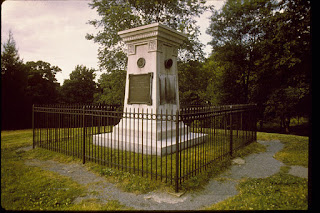Amateur American historians (me included!) often debate when
the American Revolution became inevitable.
Was it the Boston Massacre?
Was it the Boston Tea Party?
Was it “the shot heard ‘round the world” as so many if us
were taught in grade school?
Or did the American Revolution become inevitable a hundred
of miles away from Boston in the Ohio Valley frontier? And a couple decades
earlier?
According to History.org, George Washington – pretty
much single-handedly, the way they wrote
their account – started a world war known as the Seven Years War.
Quick quibble - It was known as the French and Indian War in
America and the Seven Years War in Europe where it embroiled much of the
Northern European continent. I know that’s hardly world-wide, but they used the
term “world war” – not me.
 |
| Fort Necessity National Battlefield Source: Wikimedia Commons |
You’ll also notice that although Washington signed the
confession, one he couldn’t read since it was in French, his Indian aid was
actually the one who killed the French ensign.
But that’s not my point.
It was this “world war” that so depleted the British coffers
that they decided to tax the colonists for their defense during the French and
Indian War. This, in turn, led to the Boston Massacre (sort of) and the Boston
Tea Party (definitely) and the battles at Lexington and Concord (inevitably).
And, of course, the American Revolution.
I remember watching a documentary on Washington and being surprised about that battle, 'cause it's not something we ever talk about or celebrate.
ReplyDeleteAlso, not sure what History.org had to say about it, but one key feature for me is how after his first trip west, he wrote a book about his adventure, which became a big hit. And so on his second trip, I think he was trying to act out a grand ambush and instead ended up being branded an assassin on his return.
At yeah, no one ever mentions how Britain had just saved our ass and how they were paying larger taxes than we were.
The crowd I hang around mentioned it. :-) Actually, the "British paid more taxes" argument doesn't work for me. No one (that I know of) ever argued that the amount of taxes was unfair, it was the way they were levied. It was as if Parliament was trying to be insulting.
ReplyDeleteOh, but they were trying to be insulting! And they did a real fine job of it, too. :-)
ReplyDelete